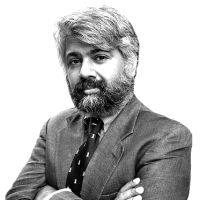It is the devil’s own task to review a game on a night when the world is speechless. How does one make sense of the disarray at Belo Horizonte, where Germany routed Brazil 7-1 in a semifinal that was supposed to hoist the host nation to yet another World Cup final?
One has to believe that Brazil was at the receiving end of some great celestial wrath. In the days before the game, there was talk of nothing else but Neymar, Brazil’s key striker and talisman, who was to miss the semifinal due to an injury inflicted on him in the quarters. The team and its management wallowed in self-pity, dwelling more on his loss—and the loss, also, of captain Thiago Silva, owing to an accumulation of yellow cards—than on the Germans. In being so wrapped in resentment over the absent Neymar, they paid the Germans scant respect. There has been a palpable hubris in Brazil these last weeks, hubris as thick as the local feijoada. Brazilians have felt entitled to this World Cup, forgetting the truth that this Brazil team is probably the worst to have taken the field for the country.
Brazilian strategy, from the start of the cup, was four-pronged: Make teams play you on reputation, not on true ability; let Neymar score the goals (since nobody else can); let Thiago Silva marshal a semblance of defense; and let the crowd do the rest. That strategy unraveled completely Tuesday night, in the face of a massacre.

First, Germany is the last side to pay blind respect to anyone’s reputation. Second and third: Neymar and Thiago Silva were absent, so Brazil had neither a goal-scorer on the night nor a notion of defense. And finally the crowd, which was to have been Brazil’s trump card, was reduced to demoralized silence by a German performance that attained clinical perfection.
The “crowd” is a potent force, and also a mercurial one. Elias Canetti has written memorably of its nature, and its effects. One wonders what he would have made Tuesday night of the mass at Belo Horizonte. At first it was raucous, trembling with patriotism, a sea of seething yellow. Then Germany scored first, in the 11th minute, through the irrepressible Thomas Müller. The decibel levels fell a fraction, but we were still in the heart of a crowd that believed in Brazil.
Then Germany scored again, and again, and again, and again, four more goals in the space of six minutes (or, counting that first goal, five in the space of 18): Miroslav Klose, Toni Kroos, Kroos once more, then Sami Khedira. After Klose’s goal in the 23rd minute, one saw the Brazilian players go limp. After Kroos’ goal in the 25th, one heard the crowd go silent: the silence of disbelief. After Kroos’ second, a minute later, the crowd’s silence grew thicker, more complex: the silence of indignation. And after Khedira’s goal in the 29th, the silence took on a different timbre: that of devastation, of death. The cameras didn’t have to search hard for weeping faces: boys, men, women, tears streaming down cheeks painted with Brazil’s colors, now irreparably defaced.

The play was so one-sided that it does not merit detailed description. To do so would be to catalog a series of Brazilian defensive horrors, each of which was castigated by the Germans. And in the second half, one saw the bizarre sight of a coach—Germany’s Joachim Loew—subbing off key players to allow them some more rest before Sunday’s finals. This, in a World Cup semifinal game…
Germany appeared to show some very un-Germanic pity in the second half, scoring only twice more when it could have had five or six, and letting the Brazilians steal a goal—no one would call it a consolation—in the 91st minute, in time added on. After he let in that last goal, Manuel Neuer, the German ’keeper, pounded the turf in anger. His clean sheet, the proudest badge a keeper can flaunt, was ruined: 7-0, in his unforgiving eyes, would have been so much sweeter than 7-1.
As for Brazil, 7-1 was just as humiliating as being blanked. In years to come, the country will refer to July 8, 2014, as among the blackest days in its history. And since this is Brazil, we’re not limiting our notion of history to football.






